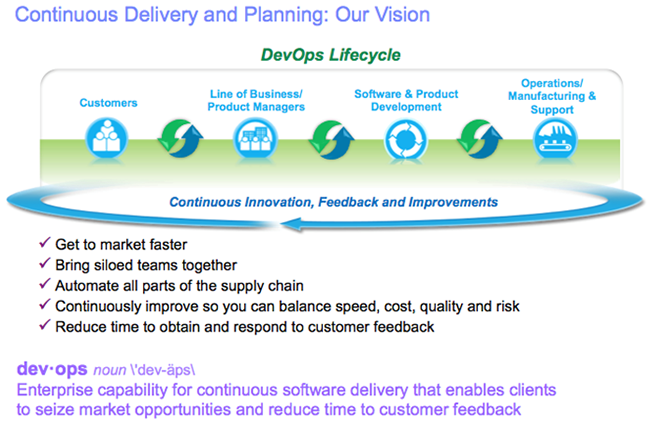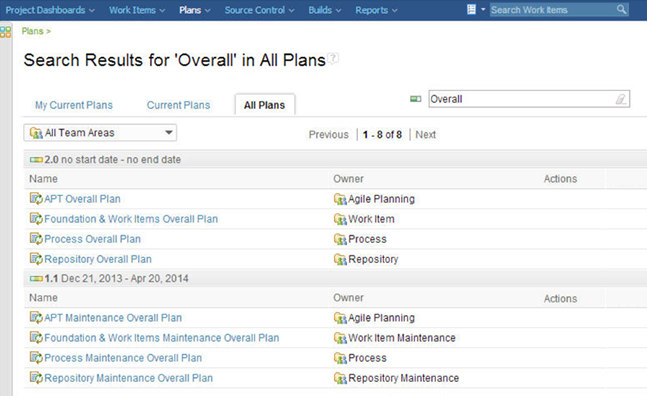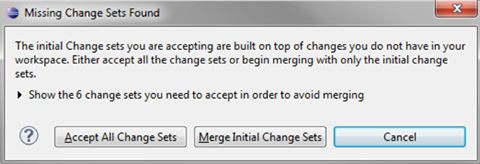We are pleased to announce the release of CLM 5.0, the next major release of Rational Collaborative Lifecycle Management (CLM). This is our 2nd quarterly release in 2014, and an exciting milestone in the lifecycle. We added many new and exciting features as part of this delivery including improvements in the key areas of DevOps and Agile development, Development Intelligence, Consumability and Ease of Use, Systems, and more. We also continue to see the benefits of developing our solutions in a self-hosted environment utilizing IBM UrbanCode Deploy for continuous upgrades.
DevOps and Agile development
DevOps continues to be a major focus for us, so we are delivering key new lean reports via Rational Team Concert (RTC) 5.0. With these lean reports you can show lead-time, cycle time and process control charts to optimize bottlenecks in your workflow and improve overall team throughput. There are new integrations in RTC for GIT that allow work item linking and process control, which we believe many of your developers will be excited to utilize. In addition, teams often have more than one plan running simultaneously or need to find one amongst many for a review. A new tab and search capability allows you to locate those plans easily and keep moving.
With the adoption of DevOps practices comes more testing, more often, and hopefully validated code as early in your delivery pipeline as possible. Rational Quality Manager (RQM) 5.0 introduces the ability to efficiently reuse test artifacts by ensuring name uniqueness. With this capability, new artifacts will not reuse names that are already in use, which can cause conflicts and confusion. RQM 5.0 also delivers the ability to run multiple automated tests in parallel via the command-line adapter. Now you can kick-off that hefty regression suite, you’ve worked so hard on creating all at one time in parallel and monitor its progress during the execution!
Development Intelligence
We introduce two key improvements to development intelligence – the Data Collection Component (DCC) and the Jazz Reporting Service (JRS). The Data Collection Component is an alternative to the Java based and Insight ETLs for CLM products. Designed to address key performance and deployment concerns, it is a solution that employs parallel processing and optimized system resource utilization to process the data more efficiently. This results in reduced overall execution time for the ETL process for CLM data, whether there is a single instance (2X improvement), or multiple instances to process (up to 20X improvement).
The Jazz Reporting Service is a new capability of Rational Reporting for Development Intelligence that provides agile cross-project out of the box reports for software lifecycle management. The service is easy to set up and provides integration with the CLM dashboards through the widget catalog. In the widget catalog there are 21 out of the box reports that cross cut areas of testing, requirements management and change management.
Consumability and Ease of Use
The RQM manual test execution Web UI has been redesigned in 5.0. The redesign offers various view modes to present the script in a way that is optimal for the type of content with which you are working. The improvement also includes user-flow optimization, such as moving the step verdict icons closer to the actual results and the ability to resize inserted images. The test result view also benefits from some of those enhancements.
As of version 5.0, IBM Rational Requirements Composer is renamed to IBM Rational DOORS Next Generation (RDNG). The features and functions that you enjoyed with the previous name are still available, and many enhancements are being delivered. One notable enhancement is separation of the requirements repository from the Jazz Team Server (JTS). This has many advantages including improvements to scalability, performance and less upgrade time down the road. Automation scripting is provided to help with the movement to this new architecture.
The CLM Server Monitoring agent provides reports and visualization to identify key problem areas related to product user activity and resource bottlenecks. This is a technical preview feature, which is open to feedback for further improvement. For more information, see the Deployment wiki article on CLM Server Monitoring agent, which includes installation instructions and test scenarios.
Systems
We know you can’t always be connected, so you can now run manual tests offline with RQM 5.0. This ability is beneficial for tests on actual products or systems while being in the field or in an isolated test lab without connectivity. The new mobile application allows tests to be run while disconnected capturing verdicts and results. Testing on the go is now a possibility!
We redesigned the internal architecture of the Jazz SCM to allow RTC to understand the order and time of change set deliveries. You’ll see some new intelligent merge capabilities that help developers decide which change sets can be used to fill a gap in a merge conflict. We improved the SCM history view in Eclipse when a file has a conflict. Now the common ancestor and the two end states for the conflict are highlighted in the history view. Developers can easily visualize what changes are in conflict and what the branch point is.
In RTC 5.0 we added an option to make simple file version-ids visible as sequential integers in the UI from places such as the history view, change summary and change details views. These simple sequential integers are designed to assist customers in formal code audits or code reviews where understanding the sequential ordering of file versions can be helpful. You can also now configure SCM process customization for server side operations using the web UI. In earlier releases, this was only possible in the Eclipse UI.
In addition to our RDNG v5.0 release, we are also delivering the first open beta of DOORS Next Generation that includes built-in configuration management features. These are the features that our largest and most demanding DOORS customers have been asking us to deliver and they now have the chance to try them out during the open beta and provide feedback.
Importance of Self-hosting
During the CLM 5.0 development cycle we continually upgraded our production CLM solution. This means we are actually developing the release on the new code throughout the development cycle. We complete production updates on each of our end-of-sprint builds. This helps ensure that we are delivering quality code by not only utilizing it day-to-day, but also going through the upgrade scenarios repeatedly in a real production environment. We surfaced some critical issues due to this self-hosting, and it is a vital part of our delivery pipeline.
During the CLM 5.0 release, we reached a tremendous milestone in utilizing IBM UrbanCode Deploy to update our production server from one 5.0 build to a new 5.0 build in under 30 minutes. This verifies that we can upgrade our production environment without any manual intervention, which gives precious cycles back to our operations team, as well as an overall reduction of production outage by over 80% from years past. If you’d like to find out more, check out Continuous upgrade with IBM UrbanCode Deploy, and Automatically generate a version of an UrbanCode Deploy component from Rational Team Concert.
And More…
To see all of what’s new, check out New and Noteworthy for Rational Team Concert, Rational Quality Manager, and Rational DOORS Next Generation, and Design Manager.
Thanks, and I hope to see you at Innovate 2014!
Andrew Hans
Rational Program Director
Collaborative Lifecycle Management – Product Delivery Lead












































































































































































